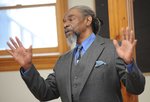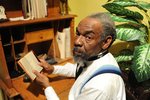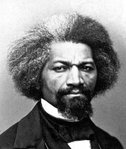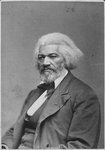 Narrowsburg
NarrowsburgLight Rain Fog/Mist, 43°
Wind: 8.1 mph
 Narrowsburg
NarrowsburgHURLEYVILLE and GLEN SPEY, NY — In honor of the bicentennial of the birth of Frederick Douglass and Black History Month, noted actor and poet Oliver King presented several programs in the guise …
Stay informed about your community and support local independent journalism.
Subscribe to The River Reporter today. click here
This item is available in full to subscribers.
Please log in to continue |





HURLEYVILLE and GLEN SPEY, NY — In honor of the bicentennial of the birth of Frederick Douglass and Black History Month, noted actor and poet Oliver King presented several programs in the guise of two of our nation’s most illustrious guiding lights in the search for equality: Frederick Douglass and Dr. Martin Luther King Jr., thus giving powerful voice to their enduring messages of rights for all people regardless of color and the non-violent protest movement.
One was born into slavery, while more than 100 years later the other grew up in relative affluence as the son and grandson of preacher men.
Oliver King of Kauneonga Lake is no stranger to the stage, as he has taken on the guise of these two remarkable men in American history on numerous occasions, most recently as Douglass at the Hurleyville Arts Center in February, and at the Homestead School in Glen Spey as Dr. King.
In the role of Frederick Douglass (1818- 1895), King focused on Douglass’s legendary speech “The Meaning of July Fourth for the Negro,” which he presented at Corinthian Hall in Rochester on July 5, 1852, more than a decade before Abraham Lincoln issued the Emancipation Proclamation on January 1, 1863. King began his recitation forcefully, tapering off to a more thoughtful tone only to conclude with a mighty crescendo of powerful words as the speech drew to a close.
In the words of Douglass, “The fact is, ladies and gentlemen, the distance between this platform and the slave plantation from which I escaped is considerable, and the difficulties to be overcome in getting from the latter to the former are by no means slight…
“…The eye of the reformer is met with angry flashes, portending disastrous times; but his heart may well beat lighter at the thought that America is young, and that she is still in the impressible stage of her existence… allow me to say in conclusion, notwithstanding the dark picture I have this day presented of the state of the nation, I do not despair of this country. There are forces in operation which must inevitably work the downfall of slavery….”
Asked his view of Douglass, King replied, “He was one ofthe catalysts;ifthere wasn’t a Frederick Douglass, there wouldhave been no Martin Luther King, no Oprah Winfrey, no Barrack or Michelle Obama… He had a prophetic nature about him, that from the time of childhood all he could think was, ‘Why am I a slave in this country… why are we chained, why are we treated like animals?’
“He always questioned his state of being… and was determined to escape bondage. He plotted his own way. He knew he would never die a slave; he knew that one day he would be free,” added King.
A few days later, Oliver King presented several programs in the persona of Dr. Martin Luther King, Jr. (no relation; 1929-1968) at the Homestead School, starting out with a presentation to the preschool and Kindergartners, followed by grades one to two, and concluding with a more in-depth address to the upper grades of four through eight.
In his presentation at the local Montessori school, King took on the role of Dr. King as he staged for the students excerpts of the Baptist minister and civil rights activist’s famous “I Have a Dream” speech of August 28, 1963.
In the words of Dr. King, “Five score years ago, a great American, in whose symbolic shadow we stand today, signed the Emancipation Proclamation. This momentous decree came as a great beacon light of hope to millions of Negro slaves who had been seared in the flames of withering injustice…
“But one hundred years later, the Negro still is not free; one hundred years later, the life of the Negro is still sadly crippled by the manacles of segregation and the chains of discrimination… languished in the corners of American society and finds himself an exile in his own land….”
Nearing the conclusion of his presentation, King again in the words of the great modern-day orator, said, “I have a dream today… one day right there in Alabama, little black boys and black girls will be able to join hands with little white boys and white girls as sisters and brothers… will be able to join hands and sing in the words of the old Negro spiritual ‘Free at last. Free at last. Thank God Almighty, we are free at last’.”
Reflecting on the tumult of transition during time of Dr. King, Oliver King said of the status of African-Americans, “The American Negro was not free… we still had segregation, black and white toilets, blacks couldn’t be served in restaurants, ‘back of the bus’ and separate schools… a black man was not free in America.”
While things have improved since Frederick Douglass, Oliver King said, “Things have gotten a lot better, but it’s still out of balance in a lot of ways… some people have a lot of old ideas, don’t understand human nature… every human being deserves the freedom to express their ideas.”
Asked what it was like to bring these two African American statesmen and orators back to life, Oliver King replied, “These are two very dynamic personages that every actor would love to portray… for myself, the mark or impact they had on American history is outstanding.”
For more photos and “Oliver King: Up Close & Personal,” visit www.riverreporter.com.
Comments
No comments on this item Please log in to comment by clicking here